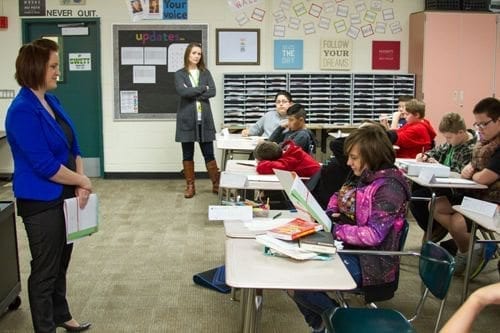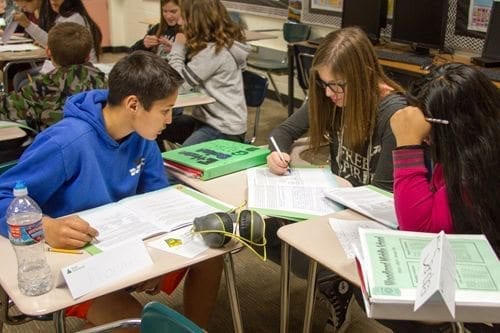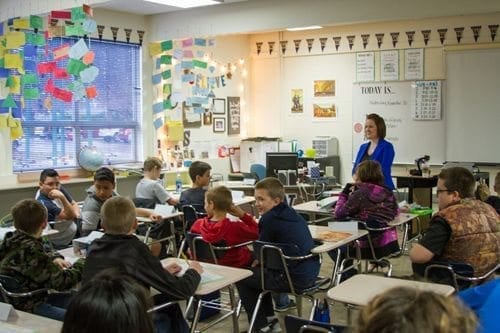WOODLAND — Woodland students learn about economics, the global marketplace, cultural differences and preparing for their own financial futures through an innovative program called Junior Achievement.
The program brings volunteer guest lecturers like Shannon Cahoon, the Community Outreach coordinator for Fibre Federal Credit Union, to class to provide guest lectures on different topics for students.
Emily Swett, a social studies teacher at Woodland Middle School, regularly enlists local professionals to provide her classes with real-world perspectives.

“The guest lectures are eye-opening for the kids,” Swett said. “Hearing professionals from the business world provide lessons with a different approach and perspective from their regular teachers proves to be incredibly valuable for students.”
Cahoon guided the class through a cultural experiment where students put themselves in the shoes of a young 14-year-old immigrant fleeing their country to come to the United States. Students pondered questions such as how are things different in other countries, what are some challenges facing immigrants to the United States, and how it might feel to have to flee your home country for a completely foreign land.
In addition, students identified ways life may have changed for the teenager, both positively and negatively. Students thought about how moving to the United States might be difficult with immigrants facing language barriers, having to meet new people, and the need for immigrants to familiarize themselves with the different culture.
“Always keep in mind that you have classmates here who came from different countries,” Cahoon explained. “They may be having a much harder time in seventh grade than you are even here in Woodland.”

Students then participated in a group assignment involving a scenario where their own family would be moving from the United States to another country.
“You need to plan carefully this long and possibly dangerous journey,” Cahoon said.
Students were told they’d be moving to a land with specific economic characteristics and weather conditions. As groups, students could choose only five items they would bring with them on the journey. Some groups decided to bring money. Others agreed to bring their cell phones and photo albums. Students realized they had to give up everything to make the change.
Students individually wrote letters describing their feelings about having to relocate to a different country. At the end of the lesson, students summed up the different themes, concepts, and new material they learned throughout the lesson. The lesson was guided by material provided by the Junior Achievement Program with students working on the assignments in their individual workbooks provided by the program.
Cahoon has spent the past five years visiting schools throughout Cowlitz County to teach lessons on macroeconomic and personal financial management as part of Fibre Federal’s community outreach services. Visiting so many different classes and grade levels presents a number of difficulties.
“The most challenging element is how each classroom in every school is so different and unique,” Cahoon said. “I’ve learned how to adapt my lessons to the different thoughts and perspectives from each of the classrooms and schools I visit.”
When Cahoon started working for Fibre Federal, there was no guidebook for her position.
“Fibre provided me with some basic expectations and I set out to create the program,” Cahoon said. “I latched on to financial education as students benefit greatly from knowing financial management, and Washington state has provided clear financial education standards for each grade level.”

In February, Swett plans to use a grant from Fibre Federal Credit Union to take her social studies classes on a field trip organized by the Junior Achievement Program where students will receive fictional roles with descriptions of their careers, family members, and descriptions of the responsibilities they have to maintain. Students will need to purchase insurance, housing, and plan for their family’s future. Students will use special software and iPads to simulate the various economic aspects of the project.
Providing students with a variety of real-world perspectives enhances Social Studies lessons.
“It’s great for students to learn the real-world applications of the things they’re hearing their parents talk about and the topics they hear from the news,” Swett said. “We focus on the global marketplace because it ties directly into our social studies program.”
Swett started teaching for Woodland Public Schools eight years ago.
“I fell into teaching after graduating with a political science degree,” she said. “While I was looking for a job, I taught as a substitute taught and fell in love with it, going back to school to get my master’s degree, and then getting my teaching position here in Woodland where I grew up myself.”
The Junior Achievement Program offers volunteer-delivered, kindergarten-12th grade programs fostering work-readiness, entrepreneurship and financial literacy skills, while using experiential learning to inspire students to dream big and reach their potential. You can learn more by visiting their website at www.juniorachievement.org.
This information was provided by the Woodland School District.




